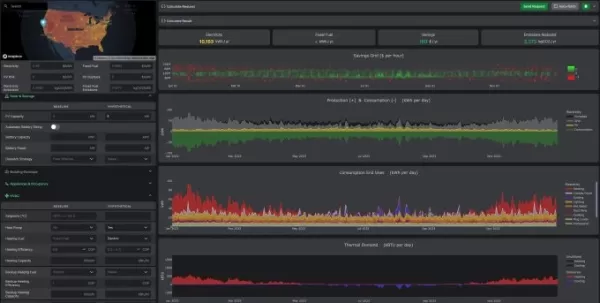Palmetto wants software developers to electrify America using its AI building models
If you're considering solar panels or a heat pump for your home, you might wonder, "How many panels do I need?" or "What size heat pump should I get?" Traditionally, answering these questions meant having a contractor visit your property. However, over the past decade, solar installation companies have streamlined this process significantly. Some, like Tesla, have even eliminated the need for an on-site visit altogether, thanks to advanced software solutions.
These software tools integrate various data sources to accurately predict how many solar panels a home requires. For instance, Palmetto, a solar installer, uses its own proprietary tool developed from software it acquired when it purchased Mapdwell, a solar mapping startup. But as the residential solar market growth has slowed, Palmetto has expanded its focus to include other electrification projects, such as backup batteries and heat pumps. Creating software for these indoor systems, which satellite imagery can't see, presents unique challenges.
To tackle this, Palmetto embarked on a project to compile data and develop a virtual representation of every residential building in the United States. Michael Bratsafolis, Palmetto's president of energy intelligence, described this endeavor to TechCrunch as "basically simulating digital twins of the entire U.S. residential building stock."
Their tool harnesses both public and private data. When specific data is unavailable, AI steps in to make educated guesses about what's hidden within the walls. For example, a home constructed in the 1950s likely has 2×4 lumber framing its exterior walls, which limits the amount of insulation possible.

Palmetto developed a demo to showcase some of the functionality the API can give developers access to. Image Credits: Palmetto
Bratsafolis explained that their technology can analyze a home and break it down into over 60 different characteristics and attributes. To ensure the accuracy of these models, Palmetto uses data from homes that have already purchased or leased solar panels from them. "That allows us to anonymize and use the real information and data about a home to compare how the model is performing and help train the model further," he said.
Palmetto's API and Developer Access
Palmetto has taken a bold step by opening its tool to external developers, a move inspired by Bratsafolis's previous experience at Twilio. "I came from that developer motion, the micro-service approach to providing API building blocks to kind of empower partners and developers," he remarked.
Developers can access the API with 500 free calls each month, after which it costs five cents per call. For larger clients, Palmetto is willing to negotiate customized pricing.
Bratsafolis hopes that developers will create tools that accelerate the electrification of U.S. buildings. By doing so, Palmetto will gain valuable insights into emerging market trends. "You just don't necessarily know what the use cases could be. And with an API product, you get incredible insight into the demand and the market," he said.
Related article
 LangChain’s Open Ecosystem Drives Scalable AI Innovation
LangChain, a leading AI framework and orchestration provider, remains dedicated to its open-source ecosystem, emphasizing its vendor-neutral approach.Harrison Chase, LangChain’s co-founder and CEO, to
LangChain’s Open Ecosystem Drives Scalable AI Innovation
LangChain, a leading AI framework and orchestration provider, remains dedicated to its open-source ecosystem, emphasizing its vendor-neutral approach.Harrison Chase, LangChain’s co-founder and CEO, to
 Cisco Warns: Fine-tuned LLMs 22 Times More Likely to Go Rogue
Weaponized Large Language Models Reshape CyberattacksThe landscape of cyberattacks is undergoing a significant transformation, driven by the emergence of weaponized large language models (LLMs). These advanced models, such as FraudGPT, GhostGPT, and DarkGPT, are reshaping the strategies of cybercrim
Cisco Warns: Fine-tuned LLMs 22 Times More Likely to Go Rogue
Weaponized Large Language Models Reshape CyberattacksThe landscape of cyberattacks is undergoing a significant transformation, driven by the emergence of weaponized large language models (LLMs). These advanced models, such as FraudGPT, GhostGPT, and DarkGPT, are reshaping the strategies of cybercrim
 xAI Unveils Image Generation API
Elon Musk's AI outfit, xAI, has spiced things up by adding image generation to its API. Right now, they've got just one model on the roster, dubbed "grok-2-image-1212." Feed it a caption, and it'll whip up to 10 images for you in JPG format, with a cap of five requests per second. Each image will se
Comments (25)
0/200
xAI Unveils Image Generation API
Elon Musk's AI outfit, xAI, has spiced things up by adding image generation to its API. Right now, they've got just one model on the roster, dubbed "grok-2-image-1212." Feed it a caption, and it'll whip up to 10 images for you in JPG format, with a cap of five requests per second. Each image will se
Comments (25)
0/200
![AlbertMartínez]() AlbertMartínez
AlbertMartínez
 August 18, 2025 at 9:01:00 PM EDT
August 18, 2025 at 9:01:00 PM EDT
Cool to see AI helping size solar panels and heat pumps! Makes me wonder if it’ll cut costs or just make contractors lazy. 😅 Anyone tried this yet?


 0
0
![JuanEvans]() JuanEvans
JuanEvans
 August 8, 2025 at 7:01:00 PM EDT
August 8, 2025 at 7:01:00 PM EDT
This AI building model stuff from Palmetto sounds cool! 😎 Makes me wonder if it’ll really simplify picking solar panels or just overcomplicate things with tech jargon.


 0
0
![DennisAllen]() DennisAllen
DennisAllen
 August 6, 2025 at 1:01:00 PM EDT
August 6, 2025 at 1:01:00 PM EDT
This AI building model stuff is wild! Palmetto’s making it so easy to figure out solar panels without a contractor trekking to your house. Bet it saves a ton of time, but I wonder if it’s as accurate as an in-person check. Still, super cool tech! 🌞


 0
0
![FrankSanchez]() FrankSanchez
FrankSanchez
 July 30, 2025 at 9:42:05 PM EDT
July 30, 2025 at 9:42:05 PM EDT
This AI building model stuff from Palmetto sounds cool! 😎 I love how it skips the contractor visit and just figures out your solar panel needs. But, like, is it too smart? What if it starts designing my house to be a giant solar farm? 😂


 0
0
![JustinKing]() JustinKing
JustinKing
 July 27, 2025 at 9:20:54 PM EDT
July 27, 2025 at 9:20:54 PM EDT
This AI building model stuff from Palmetto sounds pretty cool! Figuring out solar panels or heat pumps without a contractor visit? That’s a game-changer. Wonder how accurate it is compared to a pro’s eye, though. Anyone tried it yet? 🤔


 0
0
![HarryLewis]() HarryLewis
HarryLewis
 April 25, 2025 at 4:24:30 AM EDT
April 25, 2025 at 4:24:30 AM EDT
PalmettoのAIモデルでソーラーパネルの必要数を計算できるなんて素晴らしい!使いやすくて、正確な見積もりが得られるから、業者に来てもらう必要がない。唯一の不満は、地元の規制を考慮していないことだけど、それでもかなり素晴らしいよ!🌞


 0
0
If you're considering solar panels or a heat pump for your home, you might wonder, "How many panels do I need?" or "What size heat pump should I get?" Traditionally, answering these questions meant having a contractor visit your property. However, over the past decade, solar installation companies have streamlined this process significantly. Some, like Tesla, have even eliminated the need for an on-site visit altogether, thanks to advanced software solutions.
These software tools integrate various data sources to accurately predict how many solar panels a home requires. For instance, Palmetto, a solar installer, uses its own proprietary tool developed from software it acquired when it purchased Mapdwell, a solar mapping startup. But as the residential solar market growth has slowed, Palmetto has expanded its focus to include other electrification projects, such as backup batteries and heat pumps. Creating software for these indoor systems, which satellite imagery can't see, presents unique challenges.
To tackle this, Palmetto embarked on a project to compile data and develop a virtual representation of every residential building in the United States. Michael Bratsafolis, Palmetto's president of energy intelligence, described this endeavor to TechCrunch as "basically simulating digital twins of the entire U.S. residential building stock."
Their tool harnesses both public and private data. When specific data is unavailable, AI steps in to make educated guesses about what's hidden within the walls. For example, a home constructed in the 1950s likely has 2×4 lumber framing its exterior walls, which limits the amount of insulation possible.

Bratsafolis explained that their technology can analyze a home and break it down into over 60 different characteristics and attributes. To ensure the accuracy of these models, Palmetto uses data from homes that have already purchased or leased solar panels from them. "That allows us to anonymize and use the real information and data about a home to compare how the model is performing and help train the model further," he said.
Palmetto's API and Developer Access
Palmetto has taken a bold step by opening its tool to external developers, a move inspired by Bratsafolis's previous experience at Twilio. "I came from that developer motion, the micro-service approach to providing API building blocks to kind of empower partners and developers," he remarked.
Developers can access the API with 500 free calls each month, after which it costs five cents per call. For larger clients, Palmetto is willing to negotiate customized pricing.
Bratsafolis hopes that developers will create tools that accelerate the electrification of U.S. buildings. By doing so, Palmetto will gain valuable insights into emerging market trends. "You just don't necessarily know what the use cases could be. And with an API product, you get incredible insight into the demand and the market," he said.
 LangChain’s Open Ecosystem Drives Scalable AI Innovation
LangChain, a leading AI framework and orchestration provider, remains dedicated to its open-source ecosystem, emphasizing its vendor-neutral approach.Harrison Chase, LangChain’s co-founder and CEO, to
LangChain’s Open Ecosystem Drives Scalable AI Innovation
LangChain, a leading AI framework and orchestration provider, remains dedicated to its open-source ecosystem, emphasizing its vendor-neutral approach.Harrison Chase, LangChain’s co-founder and CEO, to
 Cisco Warns: Fine-tuned LLMs 22 Times More Likely to Go Rogue
Weaponized Large Language Models Reshape CyberattacksThe landscape of cyberattacks is undergoing a significant transformation, driven by the emergence of weaponized large language models (LLMs). These advanced models, such as FraudGPT, GhostGPT, and DarkGPT, are reshaping the strategies of cybercrim
Cisco Warns: Fine-tuned LLMs 22 Times More Likely to Go Rogue
Weaponized Large Language Models Reshape CyberattacksThe landscape of cyberattacks is undergoing a significant transformation, driven by the emergence of weaponized large language models (LLMs). These advanced models, such as FraudGPT, GhostGPT, and DarkGPT, are reshaping the strategies of cybercrim
 xAI Unveils Image Generation API
Elon Musk's AI outfit, xAI, has spiced things up by adding image generation to its API. Right now, they've got just one model on the roster, dubbed "grok-2-image-1212." Feed it a caption, and it'll whip up to 10 images for you in JPG format, with a cap of five requests per second. Each image will se
xAI Unveils Image Generation API
Elon Musk's AI outfit, xAI, has spiced things up by adding image generation to its API. Right now, they've got just one model on the roster, dubbed "grok-2-image-1212." Feed it a caption, and it'll whip up to 10 images for you in JPG format, with a cap of five requests per second. Each image will se
 August 18, 2025 at 9:01:00 PM EDT
August 18, 2025 at 9:01:00 PM EDT
Cool to see AI helping size solar panels and heat pumps! Makes me wonder if it’ll cut costs or just make contractors lazy. 😅 Anyone tried this yet?


 0
0
 August 8, 2025 at 7:01:00 PM EDT
August 8, 2025 at 7:01:00 PM EDT
This AI building model stuff from Palmetto sounds cool! 😎 Makes me wonder if it’ll really simplify picking solar panels or just overcomplicate things with tech jargon.


 0
0
 August 6, 2025 at 1:01:00 PM EDT
August 6, 2025 at 1:01:00 PM EDT
This AI building model stuff is wild! Palmetto’s making it so easy to figure out solar panels without a contractor trekking to your house. Bet it saves a ton of time, but I wonder if it’s as accurate as an in-person check. Still, super cool tech! 🌞


 0
0
 July 30, 2025 at 9:42:05 PM EDT
July 30, 2025 at 9:42:05 PM EDT
This AI building model stuff from Palmetto sounds cool! 😎 I love how it skips the contractor visit and just figures out your solar panel needs. But, like, is it too smart? What if it starts designing my house to be a giant solar farm? 😂


 0
0
 July 27, 2025 at 9:20:54 PM EDT
July 27, 2025 at 9:20:54 PM EDT
This AI building model stuff from Palmetto sounds pretty cool! Figuring out solar panels or heat pumps without a contractor visit? That’s a game-changer. Wonder how accurate it is compared to a pro’s eye, though. Anyone tried it yet? 🤔


 0
0
 April 25, 2025 at 4:24:30 AM EDT
April 25, 2025 at 4:24:30 AM EDT
PalmettoのAIモデルでソーラーパネルの必要数を計算できるなんて素晴らしい!使いやすくて、正確な見積もりが得られるから、業者に来てもらう必要がない。唯一の不満は、地元の規制を考慮していないことだけど、それでもかなり素晴らしいよ!🌞


 0
0





























